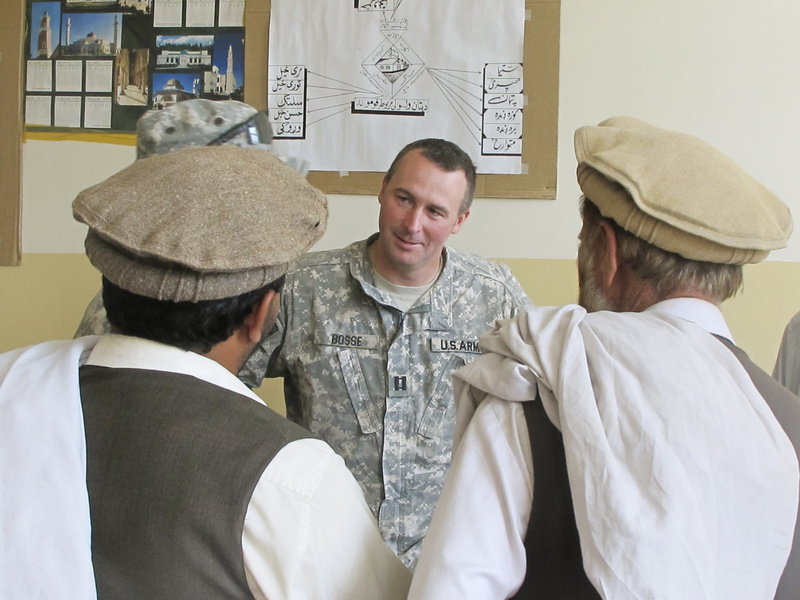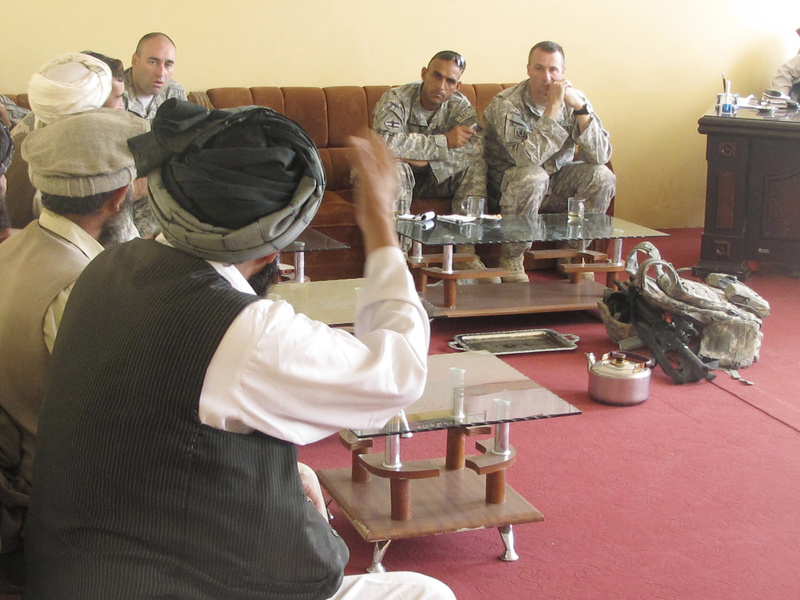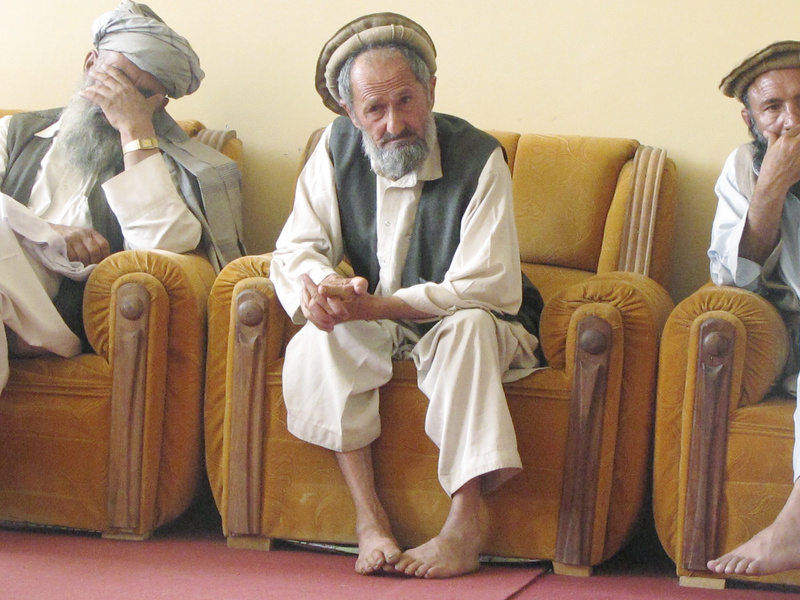Originally published June 15, 2010
DAND WA PATAN, Afghanistan — The young man, in his late teens, stood out in the room full of Afghan village elders. He’d come with a simple request.
“We need equipment to play cricket,” he said through an interpreter to Capt. Paul Bosse of Auburn, commander of the Maine Army National Guard’s Bravo Company, 3rd Battalion, 172nd Mountain Infantry. “I’ve asked many times before, but nothing.”
“Well, you’ve never asked me,” Bosse said with a smile. “I’ll see what I can do.”
Bravo Company came here, without question, to fight the Taliban and other insurgents who use this region on the Pakistani border as an underground highway in their never-ending quest to destabilize the district, provincial and national governments of Afghanistan.
But there is another side to the Mainers’ mission.
It’s not as high-profile as armored vehicles and 120 mm mortars and traffic control points where you’d best stop when so ordered or suffer a .50-caliber machine-gun round through your car radiator (or worse).
Still, some see gatherings like the one Monday between Bosse and village elders as the fulcrum on which U.S. hopes in Afghanistan will rise or fall.
It’s called a “shura.” Back home in Maine, it would be the equivalent of municipal leaders from, say, Cumberland County gathering once a week to compare notes, talk about what’s working and what isn’t and, most of all, complain.
“There are usually a lot more people here,” Spc. James Cline of Westbrook, a member of Bravo Company’s intelligence unit, said as the Americans dismounted from their three armored vehicles and walked across the austere courtyard to the conference room.
There, sitting in a rectangle of rust-colored, upholstered armchairs, sat 16 elders – most from villages a short distance from Bravo Company’s nearby Combat Outpost Dand wa Patan.
The elders’ bare feet rested on a wall-to-wall, plain-red carpet – in keeping with Afghan custom, they’d left their footwear in an outer hallway. In a corner, at a large desk, sat Neaz Mohammed Khalil, sub-governor of Afghanistan’s Dand wa Patan District.
The first order of business was attendance – or the lack thereof. When Cline last attended a shura, four weeks ago, before going home on leave, so many elders showed up that they spilled into an adjoining room.
Now, they sat only against the walls, leaving the middle of the room empty.
“We are not enough of a shura,” lamented one elder (through Bravo Company’s interpreter), motioning around the room. “We have to bring all the tribes here and not just the individuals. We have to make a big meeting – everybody should take part in the meeting.”
The reason for the drop-off?
“They can’t come,” the sub-governor later explained. “They’re scared from the Taliban.”
Next, the elders moved on to “projects,” which means anything and everything the U.S. government pumps into the regional economy through its Provincial Reconstruction Teams.
The projects are hardly complicated: One village might get a retaining wall to prevent its farm fields from washing away during the spring floods. Another might get a main road paved, or a small bridge built.
Everyone, it seemed, felt that his village wasn’t getting enough – and that the others were getting too much.
“You can send some people to my village. See it. If it’s important, then you will know it’s important,” said one man. “If it is not important, then you will know it’s not important. But please send some people to see my village, my area. I think it’s important to start a project in my village.”
“You talk about your village,” countered another. “But we want to talk about our village.”
Through it all, Bosse sat between his interpreter and the sub-governor, his chin on his hands, listening patiently.
Finally, 40 minutes into the meeting, it was the American’s turn to speak.
And with that, the agenda shifted dramatically.
“First and foremost, I know, there are fighters who are causing problems – who are making women wash their clothes, making people feed them, making people provide them with shelter, food and water. They are not Afghan, but foreign fighters,” Bosse said. “And so I think everybody recognizes that we have a problem with the border.”
Heads around the room nodded in unison.
Bosse said he wanted to establish new border checkpoints to stem the flow of insurgents coming into the area from Pakistan.
“That shouldn’t hinder normal traffic,” he said. “People should be able to still go and visit their family. But the expectation is that you will be checked so people can’t bring fighters and materiel in.”
Bosse then asked for a show of hands so he could see who would support such an expansion of the area’s American-Afghan military footprint.
All of the elders raised their hands.
Next item.
Noting that Bravo Company’s soldiers and their Afghan counterparts are determined to push into remote parts of the district that are still controlled by the Taliban, Bosse said there may be times when the troops need logistical support from the local population.
“Now certainly we’re a military organization and we want to do our own re-supply, we want to be able to supply ourselves,” he said. “But necessity dictates that we would like to be able to get water and possibly food that we would pay more than a fair price for.”
Again, Bosse asked for a show of support. Around the room, heads nodded. One elder gave a thumbs-up.
Finally, Bosse returned to the litany of complaints about the projects. As the ranking military authority for miles, his recommendations to higher-ups essentially determine which of the projects, capped at $5,000, go forward and which don’t.
“I know there’s some frustration with the amount of projects that haven’t happened,” he said. “I’m frustrated, too.”
Then he let them have it.
“But it doesn’t make any difference how many retaining walls the United States builds,” Bosse said. “This is about security. And if you want to live free from Taliban rule, then there’s no amount of retaining walls that we can build that makes a difference.”
The room, where minutes earlier six, seven or more elders spoke at once, was now pin-drop silent.
“Why should your loyalty be more if I build you a retaining wall than if I don’t build you a retaining wall?” Bosse asked. “We still need you to be loyal to the government and we still need you to be loyal to the people who are trying to protect you. Don’t use that as an excuse for not supporting your government.”
With that, Bosse thanked the Afghans for their time and the hour-long meeting adjourned.
Some of the elders left immediately – particularly those who, according to Bosse and Cline, are known associates of the Taliban and come to the shuras more for reconnaissance than nation building.
Others lingered.
One elder asked for a shipment of HESCO barriers – metal-and-canvas cages that, when filled with dirt, provide excellent protection for U.S. military installations. They also make good retainer walls.
“If I gave out all the HESCOs that people ask for, I’d be sitting in an open field,” a smiling Bosse told the man. “Are you just looking to block water?”
Yes, the man nodded.
“I might have something else that can do that,” Bosse said.
Then, out of nowhere, appeared the much younger man in search of equipment for his fledgling cricket team.
Cline, Bravo Company’s intelligence team member, quickly asked the age of the players.
“Eighteen, 16, 17,” the young man replied through the interpreter.
Beyond the obvious – that’s prime recruiting age for the Taliban – the wheels in Cline’s head were turning fast.
It happens that sometime in the next two weeks or so, Bravo Company plans to launch a local radio station that will broadcast music, news and, of course, pro-American messages.
In addition to planning a free distribution of radios and a leaflet drop to publicize the new station, Cline has already hired a handful of deejays. One of them, it turns out, has friends on Afghanistan’s national cricket team.
“So I was going to have some of those guys come here – and if they do, I could have them meet up with (the local team),” Cline said.
Later, back at COP Dand wa Patan, Bosse said he truly hopes he can make the cricket-team request happen.
But if he has learned one thing since coming to this remote combat outpost in March, it’s that nothing comes easy here.
People who promise to attend a meeting, when the time comes, are nowhere to be found.
People who raise their hands and say they support you, in reality, don’t.
And getting a set of cricket equipment to a group of young men teetering on Dand wa Patan’s ideological divide, however simple it may sound, isn’t.
Bosse said he has learned in his few months here that to flat-out promise anything is to invite disappointment: A rock slide might block an access road, or an uptick in insurgents’ attacks might reduce the supply chain to food, water and, above all, ammunition for American troops.
Hence, as he spent Monday morning fielding requests from the Afghan citizenry, Bosse never ventured beyond “I might be able to help you” or “I’ll see what I can do.”
Fair enough. But even now, it’s hard not to root for the Dand wa Patan cricket team.
“It’s too easy. It shouldn’t be hard,” Bosse agreed. “But out there in Dand wa Patan, everything is hard.”
Columnist Bill Nemitz can be contacted at 791-6323 or at: bnemitz@pressherald.com
Send questions/comments to the editors.






Success. Please wait for the page to reload. If the page does not reload within 5 seconds, please refresh the page.
Enter your email and password to access comments.
Hi, to comment on stories you must . This profile is in addition to your subscription and website login.
Already have a commenting profile? .
Invalid username/password.
Please check your email to confirm and complete your registration.
Only subscribers are eligible to post comments. Please subscribe or login first for digital access. Here’s why.
Use the form below to reset your password. When you've submitted your account email, we will send an email with a reset code.